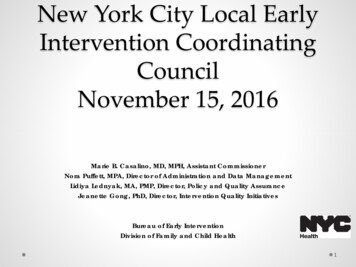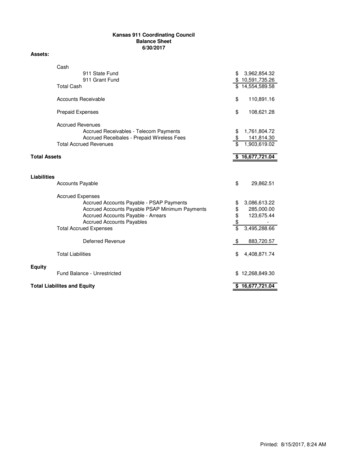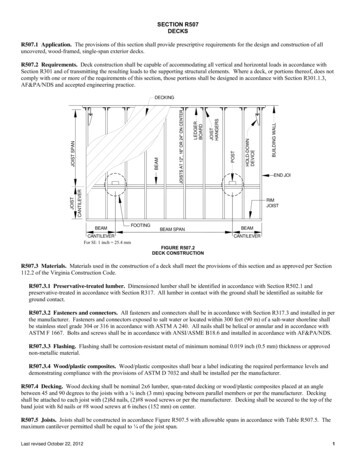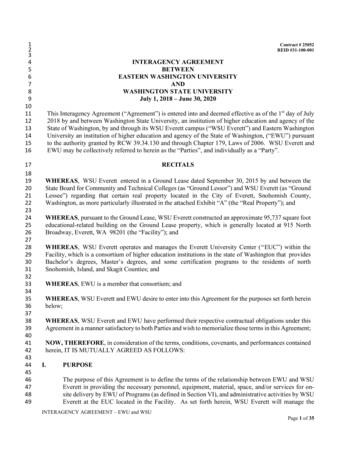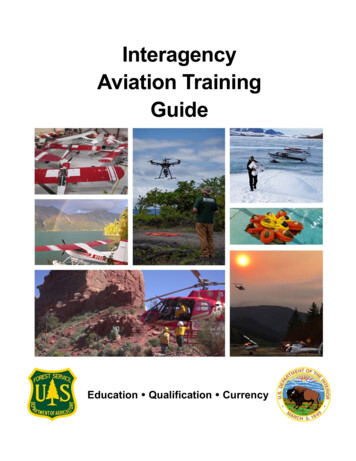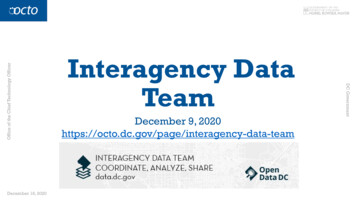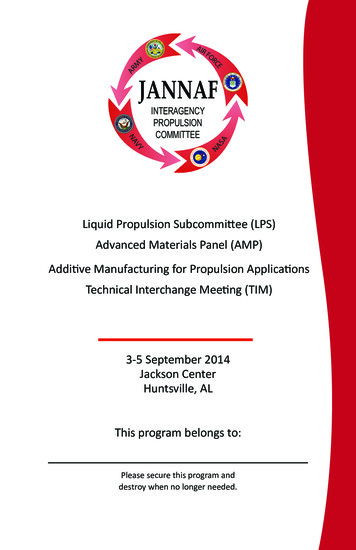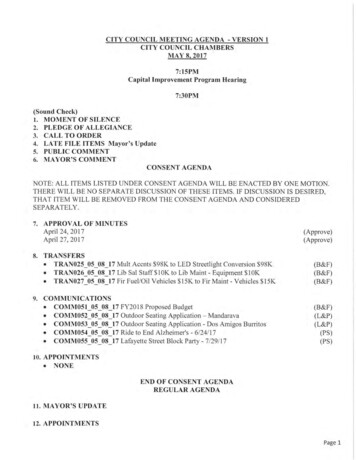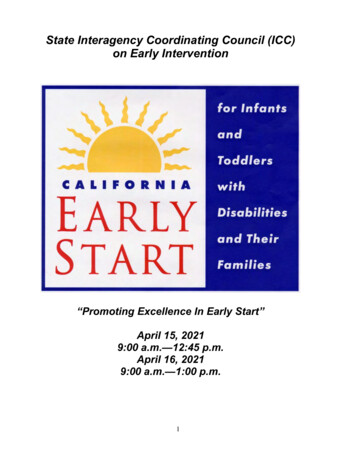
Transcription
State Interagency Coordinating Council (ICC)on Early Intervention“Promoting Excellence In Early Start”April 15, 20219:00 a.m.—12:45 p.m.April 16, 20219:00 a.m.—1:00 p.m.1
Interagency Coordinating CouncilApril 15-16, 2021Table of ContentsMission Statement . Page 3Contact List . . Page 42021 Public Meetings Notice. . . Page 7Meeting Agenda April 15, 2021. . Page 12 April 16, 2021 . Page 13Previous Meeting Minutes January 14, 2021. . . . Page 15 January 15, 2021 . Page 19Additional materials can be found at:Interagency Coordinating Council InformationPublic NoticeMember RostersWebsite ListMaster CalendarMeeting ScheduleAcronymsHandoutsTravelThe Interagency Coordinating Council is an open public meeting that may be recorded, provided itdoes not cause a disruption to the proceedings.2
Interagency Coordinating CouncilOn Early Intervention (ICC)ICC Mission StatementThe mission of the ICC is to promote and enhance a coordinated family service system for infantsand toddlers, ages birth to three years, who have, or are at risk for having, a disability, and theirfamilies, utilizing and encouraging a family-centered approach, family-professional partnerships, andinteragency collaboration.The History of the ICCCalifornia has a long history of providing early intervention services to infants and toddlers, ages birthto three years, and their families. In the 1960s and 1970s, special education services for infants andtoddlers were provided in public schools and funded through various local, state and federal sources.With the advent of the Lanterman Developmental Disabilities Services Act (Lanterman Act) in 1969,California demonstrated its support of young children with prevention and early intervention servicesfor infants with developmental disabilities through the regional center system. This was a huge effortand viewed as a major investment in California’s children.In 1988, the first ICC convened to provide advice and assistance to the Department of DevelopmentalServices (DDS) regarding implementation of a coordinated early intervention system in California. In1993, after five years of state and local planning activities in preparation for full implementation ofPart C of the Individuals with Disabilities Education Act (IDEA), the Governor signed the CaliforniaEarly Intervention Services Act (CEISA: Title 14, Government Code section 95000 et seq.) CEISAestablished state authority to enhance California’s early intervention service system to meet the newfederal requirements under Part C. CEISA assigned DDS as lead agency in collaboration withCalifornia Department of Education (CDE). Other collaborative partners involved in the ICC includeDepartment of Social Services (DSS), Department of Managed Health Care (DMHC), and First 5California.Although the early intervention landscape has changed over the years in California, the ICC hascontinued to follow, advise, and assist DDS on the state of the early intervention community.The changes have included amendments to CEISA that brought the addition of provision of familysupport services by Early Start Family Resource Centers (FRC). FRCs provide services such asparent-to-parent support, information dissemination and referral, public awareness, familyprofessional collaboration activities, and transition for families. CEISA also clarified state coordinationand collaboration with families and communities, service coordinator competencies and caseloadsize, evaluation and assessment, parent rights, referral to local FRCs and monitoring efforts. Lastly,CEISA was amended to clarify that the Part C program is based on existing systems and howregional centers must comply with the Lanterman Act. This includes regulations related tovendorization and rate setting as long as the application of state law does not conflict with earlyintervention statutes.3
Interagency Coordinating CouncilAppointed MembersNameNorayma CabotMatt ChesnutMichelle DoveSharon DeRego(For NancyBargmann)Susan DucoreDouglas Erber*SallyGrevembergMarie KannePoulsenAlma Martinez*Richard OlneyShanice OrumSarah NevilleMorgan(For TonyThurmond)SuzanneSherinian(For MichelleRouillard)StephanieWelchLeanneWheelerLisa WitcheyCompositionProvider/Plaza de laRaza ChildDevelopment SvcsInc.Provider/ParentInfant ProgramsAgency Rep/HeadStartAgency Rep/DDSEarly InterventionServicesIndian viderEmail Addressncabot@pdlr.orgPhone(562) 483-9944mattc@parentinfantprograms.com(530) 247-1375mdove@kcao.org(559) .ca.gov(916) 654-3681(916) 654-1897susan.ducore@ihs.gov(916) 930-3981dougerber@hotmail.com(310) 965-9050sallyrenee@me.com(209) 465-2311Personnel/Preparation ChairParent/CommunityMedical CentersAgency Rep/CDPHMedi-CalAgency Rep/DSSmpoulsen@chla.usc.edu(323) 361-3819AMartinez9@communitymedical.org(559) 724-4386richard.olney@cdph.ca.gov(510) 231-7408Shanice.Orum@DSS.ca.gov(916) 215-2973Agency Rep/CDEPreschool ServicesSNevilleMorgan@cde.ca.gov(916) 319-0900Agency Rep/DMHCHealth Caresuzanne.sherinian@dmhc.ca.gov(916) 255-2391Agency Rep/CHHSStephanie.Welch@chhs.ca.gov(916) 538-7139Agency Rep/CDEHomeless ChildrenAgency Rep/DSSlwheeler@cde.ca.gov(916) 319-0383Lisa.Witchey@dss.ca.gov(916) 651-60204
Interagency Coordinating CouncilCommunity RepresentativesNameBrigitte AmmonsTeresa AndersonTony AndersonKathy AngkustsiriBrenda BaldeonMaurine BallardRosaYvette O. Baptiste*Jazmine BlackmanFlorence Bracy*Elena Bramble*Shan ChanFran ChasenPam ChuehWanda DavisKaren MoranFinelloEdyth GallardoRachel HagansAmy HansenSamanthaHebermehl*Leah HowleyLucero IrizarryLaurie Jordan*RepresentationDisabilityRights/AdvocacyThe Arc and UnitedCerebral Palsy CaliforniaCollaborationExecutiveDirector/Valley MountainRCUCD MIND InstituteProvider/West CoastSpeech & SwallowRehab ServicesCSUS Special EdFacultyParent/Eastern LA FRCProvider/CarouselDevelopmental ServiceEmail 213) 427-8747gteresa@thearcca.org(916) 552-6619Parent/Autism FamilyAdvocateRowell FamilyEmpowermentof Northern CA Inc.Kinder Speech andLanguageIDA Public PolicyLiaison Executive DirectorWarmLine FamilyResource CenterFirst 5WestEdbracyflorence2013@gmail.com (323) 574-0862tanderson@vmrc.net(209) et(916) 703 0235(626) 715-2361maurinebr@csus.edu(916) 708-5285ybaptiste@elafrc.net(626) 300-9171Jazmine.blackman@carouseldev.co(909) 496-2022melenab@rfenc.org(530) 209-3621shan@kinderspeechlanguage.com(818) 280-9757fran.chasen@gmail.com(310) 452-1142Pam@warmlinefrc.org(916) 25) 771-7428(626) 574-6904Early Start ProgramManager/Inland RCCentral Valley RCEaster Seals ) 9) 738-2264(916) 679-3142Samantha.heb@gmail.com(702) 241-2352Easter Seals SuperiorCaliforniaCAEYC Board MemberParent/Tri-Counties il.comljordan@tri-counties.org5(951) 323-3670(805) 288-2544
Linda Landry*Jordan LindseyParent/FRCNCAThe Arc of ther LittleGayatri MahajanFirst 5 AssociationNBRC/Medical Director,Sutter Sacramento HRIFParent/Warmline FRCEarly InterventionProviderParent/Alpha FRCZero to ThreePart C ConsultantCalifornia DisabilityCommunity 97@gmail.com(323) 255-0354(916) 552-6619(916) 905-2153(510) 227-6967(707) 256-1100diana@warmlinefrc.orgmillarrp@ah.org(530) 564-8645(805) rgmichelle oliver@sccoe.orgmartyomoto@att.net(805) 683-2145(213) 395-3901(408) 506-5173(916) nny Days of CaliforniaRetired CDEParent/COEParent/FRCNCAValley Mountain et(916) 262-7283(415) 282-7494x194(858) 432-4749(530) 300-6979(707) 477-4570(916) 962-0832(209) 674-6509Diana Maffei*Robin MillarPatricia Moore*Christina NigrelliMichelle OliverMarty OmotoJulie Rems-SmarioRobert RochinSheri RosenNancy SagerPatricia Salcedo*Debbie Sarmento*Tara SisemoreHesterScott TurnerPablo VelezDiane Williams*ParentEast San Gabriel SELPA sturner@c-vusd.orgAmigo Babypvelez@amigobaby.comAlta California Regionaldwilliams@altaregional.orgCenter(626) 966-1679(805) 901-1237(916) 978-6417Interagency Coordinating CouncilSupport StaffNameMaricris AconJanuary CraneSharon DeRegoEmily WoolfordJessica Dailey-KeithlineShay WillisTownley SayeCathy SchulzeVirginia ReynoldsAgencyDDSDDSDDSDDSDDSDDSDDSDDSWestEdEmail ovvreynol@wested.org6Phone(916) 654-2250(916) 639-4722(916) 654-3681(916) 654-2133(916) 654-2767(916) 654-1590(916) 654-3111(916) 657-2692(916) 654-4016
STATE OF CALIFORNIA—HEALTH AND HUMAN SERVICES AGENCYGAVIN NEWSOM, GovernorInteragency Coordinating Council on Early Intervention1600 Ninth Street, Room 320, Sacramento, CA 95814(916) 654-1590 · FAX (916) 654-3255 · TTY (916) 654-20542021 Interagency Coordinating Council Meeting DatesThe following is information regarding the 2021 Interagency Coordinating Council on EarlyIntervention (ICC) Meetings. At this time meetings are being held via Zoom. The instructionsand links to join the meeting are included in the meeting packet. Remote connectioninformation available upon request.Individuals who require accommodations in order to attend the meeting (i.e., assistive listeningdevices, interpreting services, materials in alternative format) should notify Jessica DaileyKeithline at (916) 654-2767 or jessica.dailey@dds.ca.gov ten days in advance of the meeting.The meeting location is accessible to individuals with disabilities. Visit our website to viewprevious ICC meeting minutes and for additional information about California Early Start.2021 Quarterly Meeting Thursday-14thFriday-15thPROPOSED AGENDA (EXAMPLE)DATE: ThursdaysTIME: 9:00 A.M.—12:00 P.M.Day One MeetingDATE: FridaysTIME: 9:00 A.M.—1:00 P.M.Day Two MeetingThe meeting will include: Review of previous Meeting Minutes Review of Agenda Review of previous meetings’ tasks Announcements State Systemic Improvement Plan (SSIP) updates Improving State Systems and Communication &Outreach CommitteesThe meeting will include: Review of Agenda Committee reports Action items (as applicable) Reports from the State DepartmentRepresentatives Public and parent input15 minutes reserved Early Intervention presentation7
Instructions for joining remotely for the ICC MeetingThe ICC Meeting will be offered in a webinar format. You are invited to attend a Zoommeeting. Participants need to call into the teleconference line AND login with a computer toview any online materials.To Connect with Audio:Dial Toll-Free Number (in USA).877 369 0926 US Toll-free877 853 5247 US Toll-freeDay OneMeeting ID: 998 1082 7610Passcode: 310849Day TwoMeeting ID: 997 6874 3350Passcode: 053117To Connect with Web:Join Zoom Meeting-Day Onehttps://wested.zoom.us/j/99810827610Join Zoom Meeting-Day Twohttps://wested.zoom.us/j/99768743350The best way to join a scheduled meeting is by clicking the link you were provided when youeither scheduled it or were invited to it (from email, calendar invitation, etc.)The link will launch Zoom and place you in the conference. This is true for all staff, as well asnon-staff.If you do not have the app, your browser will download the installer and prompt you to run it.Once the installer has run, it will ask for your name and then take you into the meeting.8
Connect audioChoose the Join Audio Conference by Phone Call tab and dial in using the providedinformation.9
Easy Tips for Successful Web Conferencing and Conference Calls*Participant Courtesies1. Use a landline if possible, for the least static interference.2. Avoid cellular and cordless phones. The potential static and poor or broken connections reduce thesound quality for all conference call participants. If you must use a cell phone, find a quiet locationwith excellent reception and limit moving around during the call.3. Know your phone features and how to use them. Do not wait until the call to figure them out.4. Turn off call waiting. It is very disruptive to the call. Most call waiting features can be deactivated bypressing 70# or *70 before dialing the conference number. (Check with your carrier.)5. Use the speaker feature on your phone only if the room is quiet and others in the room areparticipating on the call with you. Speakerphones can add to the overall noise of the teleconferenceand create a hollow sound on the call.6. Choose a quiet location. Avoid background noises such as a radio, TV, pets, or side conversationswith others.7. Stay focused and participate on the call. Avoid using this time to answer email, eat, clear off yourdesk, file papers, or talk to others.8. Be on time.9. Introduce yourself when you join the call. If you join the call late, wait for a break in the conversationto announce that you have joined or until the moderator asks who joined.10. Introduce yourself each time you speak. Not everyone will be familiar with your voice.11. Mute your phone (*6) if you are not participating at the time, need to talk to someone else, or need toleave the call for any reason. Unmute your phone (#6) when you are able to return to the call.12. Never put the call on hold. Either mute your phone (*6) and unmute your phone (#6) to rejoin, or hangup and call in again if you must leave the call.Facilitator/Chairperson Courtesies1.2.3.4.5.6.7.8.9.10.11.Be familiar with the audio controls.Start—and end—at the scheduled time.Have an agenda—preferably one that has been distributed prior to the conference.Identify yourself when you first connect to the conference call.Identify yourself each time you speak. Others may not know your voice. Speak clearly and at amoderate speed.Take roll call at the conference start so that everyone knows who is involved and listening.Review the rules of etiquette and ask that each participant identify him or herself before speaking.Allow only one individual to speak at any given time during the conference.As much as possible, when appropriate, address questions to individuals by name.Mute the microphone or speakerphone (*6) if you must speak to others in the room with you during theconference. Unmute by pressing #6.Address agenda items in their specified order.*Thank you to the Family Resource Center Network of California, the source for many of these tips, forsharing its teleconference etiquette.10
April 15-16, 2021AGENDA11
ICC Meeting Agenda (Day One)AGENDA ITEMS9:00—9:15RESPONSIBILITYOpening 9:15—10:15Date: Thursday, April 15, 2021Time: 9:00 a.m.- 12:45 p.m.Room: ZoomWelcomeIntroductions/Roll CallReview AgendaAnnouncementsMarie Kanne Poulsen, ICC ChairImpact of Poverty on Brain Development and theEffectiveness of Telehealth in Low IncomeSara Torten, OTD, mittee Meetings, Breakout Sessions12Communications and OutreachImproving State Systems
ICC Meeting Agenda (Day Two)Date: Friday April 16, 2021Time: 9:00 a.m.—1:00 p.m.Room: ZoomAGENDA ITEMS9:00—9:159:15—9:35Opening Welcome Introductions/Roll Call Review Agenda Approve January Meeting Minutes Part C Literacy –TBDMarie Kanne Poulsen, ICC ChairImproving State SystemsCommunications and OutreachDarby’s Legacy Ad HocCommittee Reports9:35—11:00 Black Maternal Mental HealthCalifornia Department of PublicHealth employeeBlack Infant Health Program11:00—11:15 BREAK11:15—11:30 Public Input11:30—12:00 Voices from the Field Zero to ThreeStatewide Screening Task ForceInfant Development Association ofCaliforniaFirst 5 AssociationThe ArcCalifornia Disability Community ActionNetwork12:00—12:10 Family Resource Center Network ofCalifornia (FRCNA)–Report12:10 —1:00 Department and Council Member ReportsRepresentatives will provide a summary andallow for discussion, questions and answers13Christina NigrelliKaren Moran FinelloFran ChasenHeather LittleTeresa AndersonMarty OmotoYvette BaptisteMichelle Dove, Head Start AgencyRichard Olney, Dept. of Public HealthShanice Orum, Dept. of Social ServicesLisa Witchey, Dept. of Social ServicesMaricris Acon, Dept. of DevelopmentalServicesSarah Neville-Morgan, California Dept. ofEducation (CDE), Special EducationLeanne Wheeler, CDE, Homeless EducationSuzanne Sherinian, Dept. of ManagedHealth CareStephanie Welch, CHHS Child MentalHealth
January 14-15, 2021Past Meeting Minutes14
Interagency Coordinating Council (ICC) on Early InterventionThursday January 14, 2021Zoom Conference CallTime: 9:00 a.m. – 12:00 p.m.OpeningDr. Marie Kanne Poulsen, ICC Chair, opened the meeting at 9:01 a.m. and welcomedeveryone with a message of hope for the new year.Roll CallRoll call was conducted.Review AgendaNo changes were made to the Agenda.Announcements Dr. Poulsen welcomed two new community representatives, Dr.Brenda Baldeon and Jazmine Blackman.Outreach to NICU FamiliesMichelle Oliver, Santa Clara County Office of EducationMichelle Kjellesvig, Santa Clara County Office of EducationHoward Doi, San Andreas Regional Center Research has shown that families are leaving the NICU with Post TraumaticStress Disorder (PTSD), including fathers, for whom PTSD is longer lastingbecause interventions are typically with mothers. Providing services to families is positive, but information about services may beoverwhelming for families. Additionally, paperwork related to a child’s transitionfrom NICU to home is challenging. In 2020, 99 referrals listed prematurity as one factor contributing to referral.More than one-third did not have smooth transition. The NICU Project was established with these goals:o Provide families a smoother transition;o Complete paperwork prior to discharge;o Initiate earlier communication with Early Start Service Coordinator; ando Connect families with the early interventionists prior to discharge.o The hope is that Early Start services will be in place when a child arriveshome. Project includes:o Intake procedure piloted with Good Samaritan Hospital, streamlinedreferral, intake, and the initial IFSP processo Services provided remotely during COVID, which supported fathers to joinand hear about intake or to be at the IFSP meeting.o A brief video about Early Start for families.o Family consent to participate in the NICU Project pilot.15
Discussion:o Members shared information about previous efforts in this arena: Fran Chasen shared about the High-Risk Infant Follow-Up projectwith the Department of Health; Linda Landry shared about a project in the NICU where parentswere buddies with NICU parents.o This is an opportunity to apply what we know about trauma-informed care,parallel process, compassionate care, and building resiliency in families.o The project will measure a child’s development and relationship quality,and how it affects development, i.e., maternal/paternal depression.o Outcome writing needs someone who understands more than justdevelopmental milestones.o Dr. Poulsen: How can we inspire all Regional Centers to adopt this?o Sharon DeRego (DDS) suggested that DDS can look at best practices andshare resources with NICUs and recommended that presentations begiven to different stakeholder groups.o Dr. Poulsen suggested that the NICU association should be part of astrategic plan.Committee MeetingsTh
Keithline at (916) 654-2767 or jessica.dailey@dds.ca.gov ten days in advance of the meeting. The meeting location is accessible to individuals with disabilities. Visit our website to view previous ICC meeting minutes and for additional information about California Early Start. 2021 Quarterly Meeti
